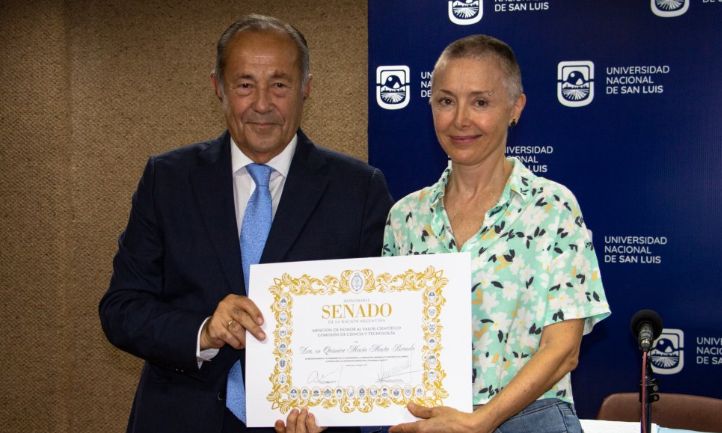María Marta Branda is a researcher who completed both her undergraduate and doctoral studies in chemistry at the National University of San Luis, Argentina.
Among her most notable contributions through various scientific and academic institutions, Branda’s research on Chagas disease stands out for the progress it represents in this field.
Her work has earned her the Honorary Mention for Scientific Merit, awarded by the Science and Technology Commission of the Argentine Senate. The prototype for a Chagas vaccine developed by Branda and her team was recognized as a significant achievement in both the scientific and technological sectors in Argentina.
Branda and her connection to science
Branda is affiliated with several scientific institutions, including the National Scientific and Technical Research Council (CONICET). She is also a member of the “Dr. Jorge Andrés Zgrablich” Institute of Applied Physics, which operates under the joint direction of CONICET and the National University of San Luis (UNSL).
The institute’s mission is to conduct and promote research in applied physics—namely, the branch of physics that incorporates technological applications. It aims to disseminate the scientific knowledge generated through research and assist external parties seeking expert guidance.
Within these institutions, Branda carries out studies related to biochemistry, physics, and molecular biology.
Among her team’s key achievements are investigations into the development of a Chagas vaccine prototype. These studies have drawn interest from researchers across the globe—especially in South America—due to their potential to advance the fight against the disease.
Chagas disease
Chagas disease, also known as American trypanosomiasis, is an infectious disease caused by the parasite Trypanosoma cruzi. It is commonly found in regions where the insects that transmit the parasite live, such as South America and Mexico.
While the disease can remain asymptomatic in humans, in cases where symptoms do appear, they can affect the heart, nervous system, and digestive tract.
Currently, treatment for Chagas disease focuses on symptom control and medication—though the latter can lead to severe side effects. In adults, the disease is often diagnosed late, making prevention difficult and leaving no effective cure.
In this context, Branda and her team are working to develop a vaccine aimed especially at addressing chronic or late-stage cases.
Her research combines computational methods, computer simulations, and bioinformatics. Branda connects these tools with medical sciences and molecular biology, focusing on the molecular level and the proteins involved in vaccine development.
Their research earned recognition from the Argentine Senate’s Science and Technology Commission for its relevance not only to Argentina but to all of Latin America.
Despite the impact of the disease, Chagas research continues to be absent from major global health agendas. The disease predominantly affects low-income populations.
The disease in South America
As Chagas disease is endemic to South and Central America and Mexico, these regions are where most research efforts are concentrated.
In Brazil, the nonprofit organization DNDi (Drugs for Neglected Diseases initiative) works to improve access to medicine and treatment for underserved populations. DNDi launched the Chagas Clinical Research Platform to connect researchers and promote the development of treatments.
The platform’s objectives include raising awareness about the disease, fostering research, and exploring alternative treatment and medication strategies.
Within Argentina, Branda is one of the scientists who has devoted her career to studying Chagas disease. Her goal is to expand treatment options beyond the currently available two medications.
Together with her team, Branda emphasizes the importance of addressing this disease scientifically and socially—especially in finding ways to treat chronic cases more effectively.



